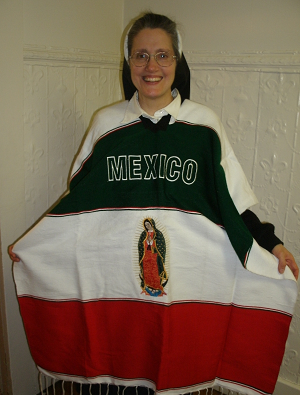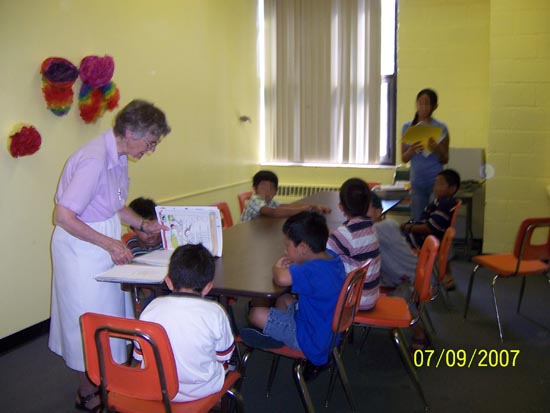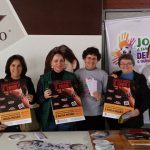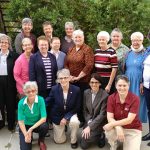Migrant Realities in the United States
April 20, 2013

 I have been asked to share stories about people I know who have been caught in the web of family separation because of current (as of April 2013) U.S. immigration practices. So the best way to tell the story is to share a variety of stories about the kinds of people involved and some common difficulties.
I have been asked to share stories about people I know who have been caught in the web of family separation because of current (as of April 2013) U.S. immigration practices. So the best way to tell the story is to share a variety of stories about the kinds of people involved and some common difficulties.
Conrado
Conrado is the husband of one of our catechists and a Eucharistic minister. He was returning home late one night from one of his two restaurant jobs that he held to maintain his family. A policeman stopped him for a small traffic violation. Because he had no social security number, he could not get a driver’s license. When the police noted that, he sent him to jail for driving without a license. Once he was processed, immigration was called and it was impossible to post bail. I visited him once before he was transferred, and the poor man just wept at the thought that he would not see his beloved family again or, at least, very soon. The trial for the traffic violations was waived and, without the family having a chance to see him, he was whisked away to the Boone County Jail in Northern Kentucky, which at that time was the holding place for immigration. Because it was very possible that he would be sent back to Mexico, I sent in a friend of mine, a retired criminal lawyer, who had him sign a power of attorney, giving his wife all rights to the children so that they could get passports to leave the country in case their father would be sent back. This lawyer called me after meeting Conrado to tell me that he had met many criminals in his lifetime but that there was no reason a man like Conrado should be locked up. He is a gentle, refined and very grateful man.
Meanwhile, at the home scene, his wife was upset, and we did not know what to tell the children. I believe neither Conrado nor his wife wanted them to think of their father in jail. So we just said that their father was in Mexico. Conrado’s father had been ill so we said he went to visit his dad.
Sister Heleen, who works with me, had Conrado’s son in First Communion class during this time. She said it was incredible to see the marked change in the boy. Before, he was always smiling and happy. As soon as his dad was gone, he was withdrawn, almost in a world of his own. He did not make first communion that year and continued the program the following year.
But Conrado did have one course of action to halt the deportation: by doing the procedure called “cancelation of deportation.” One must prove that he has been here ten years or more, has a child born here, has paid taxes, and has never had a serious conviction. This requires the service of a lawyer. Since Conrado completed all these conditions, he was able to get an immigration lawyer for $8000. He also had to post bail to leave, at the least $1500, if immigration decides to give one a bond. This is a very difficult case to win because one has to prove that it would be an “extreme hardship” to live without one’s father. I was in an immigration proceeding in which the prosecutor said that yes, it was difficult for the sons to live without their father, but it was not unusual or extreme hardship!
Conrado’s case, after about 5 years, is still not resolved. After Immigration closed their courts in Cincinnati and sent all cases to Cleveland, their Cincinnati lawyer no longer wanted the case, so he transferred it to a Cleveland lawyer. Now that lawyer is charging thousands of dollars more and postponed the case until the family pays all the money. Court is scheduled for this October. Please pray!
Paco
Another case involves a parishioner, Paco. Paco is known to prepare food for a sale to help the church. He was picked up for not having a light for his license plate. His wife, another one of our catechists, came sobbing into our office to tell us that Paco was picked up. She is very charismatic and she carried her Bible. She was saying that God will not allow their separation because man cannot divide what God has joined together. We strove to find meaning in this man’s suffering, and we were both drawn to the book of Job that gave us no answers except that we must trust God because suffering is a mystery. Five days after Paco’s arrest was Palm Sunday, and he would have acted as a soldier in our live Way of the Cross. Only now his Way of the Cross was more real. Mari, his wife, had the role of Mary that year. Mary has a monologue, speaking to Jesus, as his dead body is laid in her arms, and she cries, “Why did they do this to you? You did not harm anyone….” That year, no one had a dry eye!
This family after years just finished paying their lawyer who actually won the case for them. Their two sons had to go to a counselor who recommended to the judge that the family not return to Mexico. These families were blessed so far because they could do cancelation of deportation but many are not.
Maria Porfiro
I remember Maria Porfirio. She and her husband, both indigenous, had two little children and a baby. He was deported because, not having been here for ten years or more, he could not even attempt a cancelation of deportation. She had no job and three small children. Her Hispanic landlord allowed her to stay on for a month or so. I talked to the Mexican consulate who gave her plane money so the family could be reunited. I took her for a flight from Cincinnati at 6 in the morning. I got her to the gate and, as she looked back as she was getting onto the plane, I prayed that the Lord would take care of her as she had never been on a plane before, was experiencing trauma, knew little English, and was managing to bring along three children, by herself.
Some families, unlike Maria Porfirio’s, decided that the family should not return home because the children would be so much better off here. The first couple, Marta and George, to get married in the church, upon my arrival here, for example. When he was sent back, trying to get legal papers, he was not allowed to come back because of a ten-year bar. She, being Puerto Rican, tried to live in his primitive village, but could not. She and the baby returned to Puerto Rico and the family split up.
Common Difficulties
One woman who came to me had just moved into a new apartment and put down a deposit when her husband was taken. We went to the new landlord who, after saying it was his strict principal not to return the deposit, finally did so after understanding her plight and for the love of God. Years ago some of the husbands used to return to be with their families and then they, having entered after deportation, could serve jail time if picked up again. Right now that is much more uncommon because crossing the border without inspection is dangerous and almost impossible. We have had a father killed this past year and another young man found dead in trying to cross the border.
As mentioned in several stories, a common practice in 2007 and 2008, and which still occurs today, is the arrest of a person for a traffic violation. The person who has some kind of traffic violation, usually no driver’s license, goes to jail and then has an immigration hold. Here in Dayton, Ohio, the Chief of Police in 2009 decided that this was just senseless, not only for immigrants but for others in Dayton as well. The Dayton police were using much of their time to fill up the jails with traffic violators when the cases could be resolved in court. So the Chief decided that, in general, for the first time of driving without a license, one should not be sent to jail. At the second or third offense, it is at the officer’s discretion. This has cut down what we found was an excruciating penalty for a relatively minor offense. Most undocumented immigrants would get a legitimate license, if it were possible, but in the state of Ohio, one needs a social security number to get a license.
One of the most painful cases of family separation for me is that of the adult daughter from her mother. She has learned everything from her mother—how to talk, how to cook, maybe how to raise her children. And it is usually because of the daughter’s husband that she has decided to come to the United States so that the family can be together. But once here, she cannot return to her home country and come back to the United States. She cannot visit her mother.
We have had a number of women who have lost their mothers in death and who have not seen them for 8 years or more. The grief they feel is almost inconsolable. It is the Mexican custom to pray the rosary for nine days with the family after a family member is buried. They do not have this family union which is part of the grieving process for them.
In fact, extended families are very important, and sometimes the children, being separated from their grandparents for so long, cannot even speak to them in their native language, as the children learn English and the grandparents know only Spanish. For example, there is an Ecuadoran girl whose parents came up here to provide for the family, leaving the girl with her grandparents in Ecuador. She eventually came to the United States to live with her parents as a teenager because she was having personal problems. Imagine meeting your parents face to face at age 15, when the last memory of them was when you were 5 years old.
In general, our youth face unbelievable fear, knowing that their parents may one day not return home. But they face other challenges as well. Many of our youth face lack of motivation. They consider the United States as their homeland because they do not remember the place where they were born. One girl was so disappointed after graduating from high school because she could not get into college; she could not drive. She said she was going back to Mexico so she could study nursing. She came here when she was five. I told her that the Mexico she is thinking about returning to is not the Mexico that she is going to find today. And if she decided that her Spanish is not good enough and that she misses her parents up here, she cannot return. She was just about to leave when President Obama’s deferred action was declared. Now she is in the process of getting a work permit and hopefully can get into a community college.
The youth in particular suffer from lack of motivation and fear. The anguish is heightened when a family member doesn’t return home on time. As the Bishops of Atlanta pointed out, separation is a daily fear. In addition, accommodating to another culture affects one emotionally. One out of every four or five immigrants faces depression due to the culture shock, lack of family support, etc. Many women admit to experiencing more stress. In their homeland, they usually did not work but took care of the home. Here they are expected to do both.
Here in the United States, we have begun to speak of legalization (not amnesty), and we think that possibly there may be hope. People may be able to travel back and forth and see family members. Young people may be able to be more like their high school counterparts with whom they identify. Yes, we may have dreams now–that families will not be broken apart, but much of our hope rests on good-willed people like you who can be voices for the voiceless.
Sister Maria Francine


 Deutsch
Deutsch Português
Português Korean
Korean Indonesian
Indonesian









![[JPIC News] The power of small step](https://www.snd1.org/wp-content/uploads/20240219-The-power-of-small-steps-Fimage-60x60.jpg)

